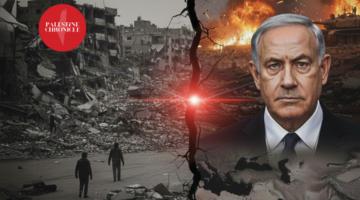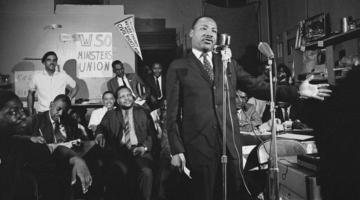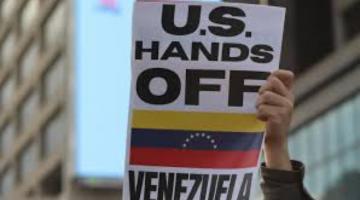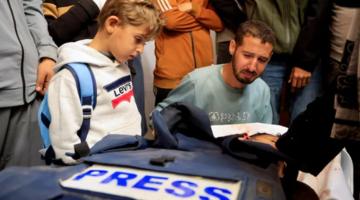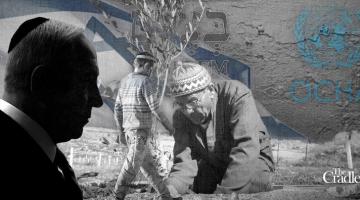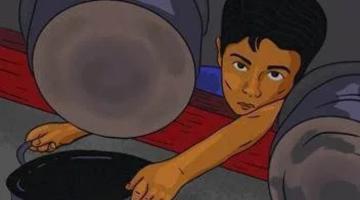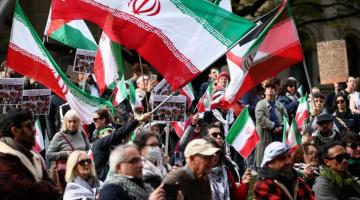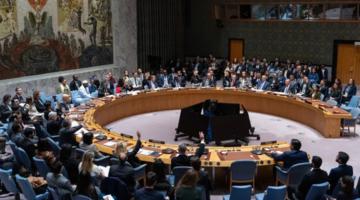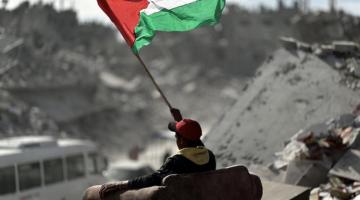Israeli Foreign Minister Shimon Peres signs the Oslo Accords on the White House Lawn. Behind him: Bill Clinton, Yasser Arafat, Yitzhak Rabin, and Mahmoud Abbas, Washington DC, September 13, 1994. (Photo: Avi Ohayon/GPO)
While Gaza burns, a collaborationist class is being handed the keys to a prison and calling it a state, all in service to western imperialism.
The word hauntology describes the persistence of elements from the past, which weigh upon the present social, cultural, political, and economic scene like a nightmare. The recognition of a Palestinian State by the UK, France, Spain, Slovakia, and other European states, then, is nothing but a colonial hauntology. This essay seeks to highlight how the Palestinian struggle has never been for such a “state”--in reality a bastion of Quisling compradors of the worst kind. Ghassan Kanafani’s essay titled “The Specter of the Palestinian State,” published in a 1970 edition of al-Hadaf, provides a touchpoint to examine the recent ‘recognition’ of Palestine by some of the major imperialist powers and their vassals. As always, Kanafani’s words penetrate deep into the analysis of the Arab national question, and much of his essay reads as if it was written yesterday.
The great martyr intellectual laid out a typology of three different scenarios of statehood, which predicted the Oslo capitulation two decades later, and also the comprador “state” being recognized by our oppressors today. Type one is a ghettoized statelet comprising what is left of the West Bank and Gaza, ruled by an Arab elite subservient to the economic, political, and military goals of the Zionists. Type two is a scenario in which the reactionary Jordanian monarchy accepts a separate peace and the mantle of legitimacy in ruling the combined ‘Jordanian-Palestinian’ people on the east and west banks of the Jordan River. The third type is described by Kanafani as:
a “state” imposed by the will of the Palestinian and Arab armed struggle, whether on liberated lands in the West Bank or elsewhere…The authority that develops on those liberated lands does not need to take the form of a “state” in the sense usually associated with that term. The fundamental basis…of such a state would be to escalate the revolution, to move it to a more advanced stage.
So, where are we now? What type of ‘state’ is being recognized by the major European powers? And is it any coincidence that this recognition is happening at the nadir of support for the Zionist colony worldwide, all the while the peoples of the imperialist countries are in open revolt against their governments, given their relations with the colony and the increasing immiseration the people face economically, socially, and politically?
Since the Oslo Accords of the mid 1990s, the ‘negotiated settlement’ regime has been working overtime to stymie the Palestinian masses and their open revolt against imperialist domination. The outcome of Oslo–what Edward Said called ‘the Palestinian Versailles’--was the Palestinian Authority (PA). This is precisely what is being recognized today: a comprador bureaucracy overseeing a bloated police force, with no independent economic intercourse, and no legitimacy in the eyes of the people. The last time the PA had any authority was during Hamas’ 2005 electoral sweep, when they decided to end their boycott of the regime and ended up winning in a landslide victory at the polls. This, of course, was not what the Zionists and their imperialist paymasters had in mind, so the CIA, Mossad, and IOF manufactured a crisis wherein the reanimated corpse of Fatah, embodied by Mahmoud Abbas, took power and has retained it ever since. Is it a mystery, then, that since the ‘recognition’ (by the very powers who created him!) Mahmoud Abbas has been calling for resistance factions to turn over their weapons and submit to the joint dictatorship of the PA and Zionism? According to Abbas: “What we want is one unified state without weapons, a state with one law and one legitimate security forces.”
As we know, Abbas waits to speak until others move their mouths, and so it was only days before when Keir Starmer said: “Our position is clear–the Palestinian state must be demilitarized. It will have no army or air force.” So, we are left to wonder, what kind of state is this? It is certainly not a state as defined by Anglo-American International Relations scholars. It has less sovereignty than Palau and the Marshall Islands. Kanafani perfectly described the purpose of such a state as recognized and supported by the imperialist powers:
This is why the “Palestinian state” idea has been pushed prematurely as something that’s within reach, something on the verge of bursting forth as a reality. The effective aim of this push is to confuse and disrupt Palestinian popular loyalty to the resistance, to fragment this loyalty, and thus steal it away.
Now that we have completed this analysis of colonial hauntology, thus exposing the Palestinian rump state as a tool of Zionism, we will explore the role of imperialism in the region and how it seeks to fracture any independent political, economic, and social renaissance of the Arab-Iranian region.
The role of imperialism is to de-develop the Arab-Iranian region or any independent poles of accumulation which rise up from within it, such as Iran today, Iraq, Syria, and Libya yesterday. A recently translated essay from 2005 by now-imprisoned former People’s Liberation Army General Liu Yazhou provides a clear perspective on this, and is worth quoting at length:
The Middle East could have formed its own economic bloc, but the U.S. smothered it in the cradle. In the 1970s, OPEC used oil as a weapon in a conflict with the West, sparking a global energy crisis. It was a brilliantly executed economic war, but its strategic intent was revealed too early. The U.S. quickly realized that the Middle East’s abundant oil reserves might allow it to become a strong economic core—and that was something America could never permit. Thus, America unveiled its Middle East strategy: bolster Israel and let it blossom in the heart of the Arab world. That wasn’t enough—it also incited internecine slaughter among the Arab states. This Middle East policy was a great success for the U.S. Israel, though small, grew stronger with every war, thanks to U.S. backing. The Arab world, though large, grew weaker with each conflict and became dependent on the U.S. The U.S. acts simultaneously as murderer, police officer, and judge.
Thus, two things become clear. When the Arab-Iranian sphere acted as a–mostly–united whole within the last half century, the effect on Western markets was devastating and functioned as a sort of general strike. Yet, secondarily, there was not a political project or unifying ideology which could match the economic action, and the region was crushed under the Zionist-imperialist boot through kinetic wars, color revolutions, intelligence operations, and assassinations. That has been the defining feature of imperialist adventurism in West Asia, and has governed all calculations made by resistance factions until October 7th, 2023 and the beginning of Operation Al Aqsa Flood, which changed the calculus dramatically.
Where, then, are the revolutionary forces? What is their position on this supposed statehood, and what is the path forward for the liberation of the entire Arab region from Zionism and imperialism?
Fourteen resistance factions representing the will of the Palestinian people met in Beijing in July of 2024 for a meeting of reconciliation facilitated by the Chinese foreign ministry. The goal of the Beijing Declaration is national unity in the face of a renewed cycle of hyper-violent kinetic warfare by the Zionists. While there is criticism to be made regarding China’s position on the so-called “two-state solution”, and their large trade volume with the colony, the fact that the Chinese give the Palestinian factions a venue to work towards national unity is a commendable step forward and also matches the goals of a great many of the Palestinian factions. While we have outlined above the disunity and disintegration of the Palestinian nation being daily executed by the Zionists and their imperialist backers, the recent UN General Assembly meeting in September 2025 highlights the importance of unity, now more than ever. Despite being banned from entry to the United States, Mahmoud Abbas used his allotted speech time to condemn resistance, call for the disarmament of Hamas, and work towards a negotiated settlement. Hamas quickly responded and highlighted the hypocrisy, betrayal, and collaborationist stance of the criminal PA.
As the martyr intellectual Fathi Al Shiqaqi once opined, the road to national unity and resistance is a fraught one:
The unity of Palestine is the unity coming from the awareness that the persistence of the Zionist entity means the failure of all renaissance projects. Therefore, the debate about what comes first: confronting dependency, Westernization, and fragmentation, or confronting the Zionist entity is a theoretical debate governed by calculations of immediate gains and loss, instead of a serious endeavor to build an integrated and coherent strategy for the contemporary Islamic renaissance’s project.
The ‘integrated and coherent strategy’ mentioned is worth considering at length, given that both the enemies and friends of the Palestinian movement for national liberation are regional and international. The Arab-Iranian region has historically been integrated and organized in large political spaces. Al Sham, the Ottoman Empire, the Umayyad Dynasty, the Fatimid Dynasty, the United Arab Republic, etc.; with this in mind, it is important to understand that across the political spectrum in Palestine and the region, this regionalism or tendency towards federation and politics of large spaces exists. In the PFLP document, Strategy for the Liberation of Palestine, the Marxist-Leninist perspective on this phenomena is given plainly:
The fact that imperialist interests are linked with the existence of Israel will make of our struggle against Israel a struggle against imperialism, and the linking of the Palestinian liberation movement with the Arab liberation movement will make our struggle against Israel the struggle of one hundred million Arabs in their united national effort for liberation…Our national, long-term liberation struggle will mean our fusion in a new way of life, which will be our gateway towards progress and civilization.
From South of Lebanon and the Shi’a perspective, Sayyed Hassan Nasrallah was firm in his conviction that the borders drawn in the region were ‘fake and colonialist’ and ‘doomed to disappear’. Thus, we have to consider, as Kanafani said, that the ‘type 3’ state will not resemble any state of the Western ‘ideal type’ or any of the colonially drawn-up states that exist today. Both the results of colonialism (false borders and division) and potential answers to remedy this (unity, regional integration) can be found in the African continent, which shares our fate in many ways.
Africa has given some of its finest sons and daughters in the battle against imperialism, colonialism, and neo-colonialism, and today there is no exception to this. The Arab-Iranian region could learn from the Sahelian Federation lessons of unity, regional integration, and anti-imperialism. The Federation of Sahel States represents a 21st century pan-Africanist project, which although in its infancy, provides a clear path forward for its peoples. The removal of the French military from Mali and Burkina Faso, as well as the removal of the French and Americans from Niger is a bold step towards the reclamation of sovereignty. This, paired with the renegotiation of mining and oil drilling contracts, and the development of indigenous industries for energy production, gold refining, and agricultural markets is key in breaking the neo-colonial chains which bind them to France and the EU. This type of vision is needed when speaking of any resolution to the Palestinian national liberation struggle and the struggle for the liberation of our entire region from backwardness, vanity, economic deprivation, and collaboration with imperialism.
In conclusion, the recognition of a Quisling, Palestinian rump state by the various European powers is a cynical move by them to avoid accountability for their role as accomplices and enablers of the mass slaughter in Gaza. This ‘state’ does not represent the will of the Palestinian people, nor can it act as a vehicle towards the dismantling of Zionism given that it is by nature a collaborator state. The answer to the Palestinian national struggle will come from Palestinian and regional resistance to Zionism and imperialism. Regional integration, unity, and development of an independent civilizational pole remain the goals of our movement. A Luta Continua.
Hanna Eid is a Palestinian American writer, researcher, and a Union electrical worker. His writing concerns mainly imperialism and anti-imperialism in West Asia and West Africa.


